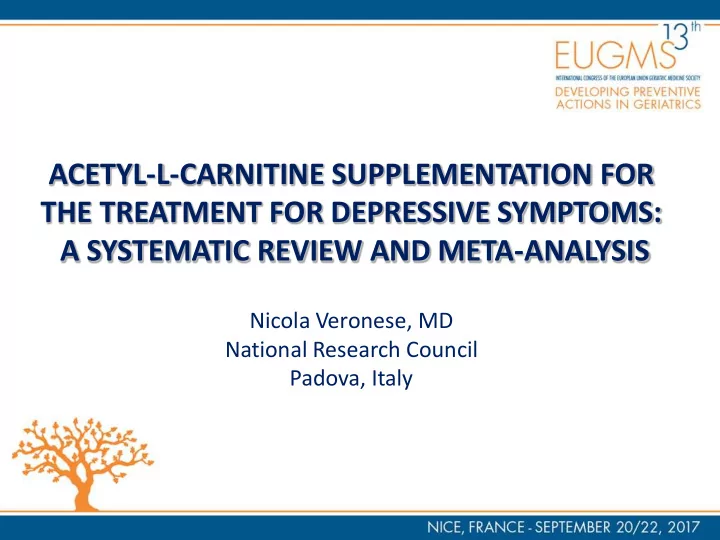

ACETYL-L-CARNITINE SUPPLEMENTATION FOR THE TREATMENT FOR DEPRESSIVE SYMPTOMS: A SYSTEMATIC REVIEW AND META-ANALYSIS Nicola Veronese, MD National Research Council Padova, Italy
CONFLICT OF INTEREST DISCLOSURE I have no potential conflict of interest to report
INTRODUCTION • Depression is common and affects about 350 million people worldwide and was the second leading cause of global disability. • Alterations of fatty acids and lipid metabolism , important contributors of neuroplasticity, often occur in depressed persons. • Carnitine appears to modulate the activity of several neurotrophic factors, cell membranes, lipid metabolism, and neurotransmitters in nervous tissues.
ROLE OF ALC IN DEPRESSION Wang SM et al. J of Psych Res, 2014: 30e37.
AIMS • A recent narrative review reported that ALC may be potentially effective and tolerable option for people affected by depression, in particular who are vulnerable to adverse events from antidepressants, such as older people . • To summarize the current evidence regarding the use of ALC as anti-depressant agent compared to placebo ( or no intervention ) compared to common antidepressant agents .
METHODS • Search strategy (until end 2016) 1. RCTs, ALC, depressive symptoms. 2. Several databases. 3. Full texts/conference abstracts, any language. • Inclusion/exclusion criteria Inclusion Exclusion RCTs Observational ALC (also as add-on) Not validated scales for depression Reporting data on depressive symptoms No data regarding depression • Outcomes/statistical analysis 1. SMDs changes of depressive symptoms in ALC vs. controls. 2. Random-effect model I2>50% meta-regression/sensitivity analyses. 3. Publication bias.
RESULTS (1): PRISMA
RESULTS (2): PLC/NONE Nine RCTs, 231 ALC vs. 236 controls; follow-up: 8 weeks Veronese et al., Psych Med., 2017, in press
RESULTS (2): AGE Veronese et al., Psych Med., 2017, in press
RESULTS (3): ANTIDEPR Three RCTs, 162 ALC vs. 162 controls; follow-up: 12 weeks Veronese et al., Psych Med., 2017, in press
RESULTS (4): ADVERSE EVENTS Veronese et al., Psych Med., 2017, in press
CONCLUSIONS • ALC supplementation appears to confer a significant decrease in depressive symptoms compared to placebo/no intervention. • ALC appears to have a similar effect to some common antidepressant agents with significantly fewer side effects. • The use of ALC is safer than some traditional antidepressants suggesting a potential role of ALC for treating depression in older people .
Recommend
More recommend